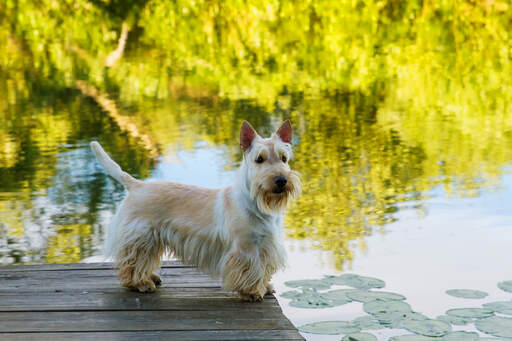Scottish Terrier Dogs












History
The first documented case of the Scottish Terrier dates back to the 1400's, but they have probably been around for a thousand years or more. They were classes as Skye type Terriers until the late 1800's when are small breeds of Terriers were subdivided into groups. Bred for vermin control, Scottish Terriers or 'Scotties' are tenacious hunters and will often dig to catch their prey.
Behaviour
Scotties are tough little dogs who are determined and have an independent air about them. They are loving towards their family and fine with children, but can be wary of strangers coming into the house. They like to be around you and definitely like a cuddle. They can be very destructive if bored and will love to dig holes in your garden; providing their own sand pit to dig in works best to stop the garden looking like a moon landscape. They will bark when someone is at the door and will need to learn that you decide who is allowed into the home, not them. They can sometimes be snappy if they are unsure of the person visiting. Early socialisation with people visiting the home will help them learn quickly. Sleeping on the back of the sofa, with a good view makes them happy; they can see what is going on outside. They are loyal and devoted to their family but can not be bothered with strangers paying them attention. They settle quickly and like to sleep on the sofa and bed. They are incredibly sensitive to the 'mood' in the house and will pick up if there is a family fight or if someone is feeling low. The dedication to their family is extreme and they are protective of them. If another dog starts a fight, they will not back down, again socialisation and adult training classes will help. They are ok if raised with cats, but as a true terrier they can and will give chase to cats, squirrels, a clump of grass in the distance or carrier bags blowing in the wind. Their recall is patchy at best and if they get the scent they will be off, usually found down a rabbit or fox hole. They are stubborn, independent thinkers who take time to train. They like to please you, but on their own terms and when it suits them. They can excel at agility and obedience if trained to a high standard and seem to enjoy the attention they receive from you. Training can be slow. Scotties like adventures and the chance to explore. A long flex lead works best as their prey instinct will mean that the squirrel on the other side of the park is more interesting than your frantic cries of 'heel'. However, they will walk for hours if you let them and like being outside with the different smells. Allowing them off lead in a secure area is fine and they are usually much better with other dogs if off the lead (like most dogs are). However, if there is a small hole under the fence, you can guarantee that a Scottie will find it.
The wiry coat needs brushing 2-3 times a week plus stripping every 3 months for show dogs and clipping for pets. Scottie cramp, Von Willebrand disease and Patellar Luxation are more common in Scotties. They also react badly to flea bites, so should be treated monthly and combed more often with a flea comb during the Spring and summer.
Temperament
Scottish Terriers have a steadfast and loyal temperament. They enjoy being by your side and will often become particularly attached to one family member. It is difficult to keep a Scottish Terrier quiet and given half the chance they will be digging up your flower beds. Friendly enough with other pets and dogs but fairly stubborn which makes them tricky to train.
Health Problems
Health problems that may affect Scottish Terriers include Scottie Cramp (uncoordinated leg/muscle spasms), epilepsy, tumours, allergies, heart disease, eye problems, luxating patella (dislocation of the knee cap), canine hip dysplasia (CHD), blood clotting disease and brain disease.
Breed Details
- Status: Common
- Life Expectancy: 11 - 13 years
- Weight: 8 - 10 kg
- Height: 10"
- Rare: No
- Coat: Long
- Grooming Requirements: Everyday
- Town or Country: Either
- Minimum Home Size: Small House
- Minimum Garden Size: Small to Medium Garden
- Breed Type: Pest Control Dog
- Size: Small
- Energy Level: Medium
- Exercise Required: Up to 1 hour
















